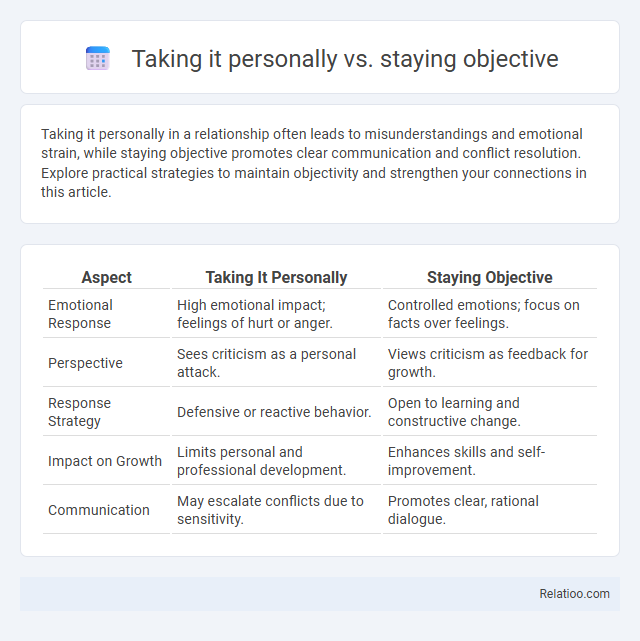Taking it personally in a relationship often leads to misunderstandings and emotional strain, while staying objective promotes clear communication and conflict resolution. Explore practical strategies to maintain objectivity and strengthen your connections in this article.
Table of Comparison
| Aspect | Taking It Personally | Staying Objective |
|---|---|---|
| Emotional Response | High emotional impact; feelings of hurt or anger. | Controlled emotions; focus on facts over feelings. |
| Perspective | Sees criticism as a personal attack. | Views criticism as feedback for growth. |
| Response Strategy | Defensive or reactive behavior. | Open to learning and constructive change. |
| Impact on Growth | Limits personal and professional development. | Enhances skills and self-improvement. |
| Communication | May escalate conflicts due to sensitivity. | Promotes clear, rational dialogue. |
Understanding Personal Reactions vs Objectivity
Understanding personal reactions involves recognizing emotional triggers and acknowledging subjective biases that shape individual responses. Staying objective requires deliberate mental strategies like distancing oneself from emotional influences to analyze situations based on facts and evidence. Emotional reactivity often leads to impulsive decisions, undermining rational judgment and hindering effective problem-solving.
The Psychology Behind Taking Things Personally
Taking things personally often triggers emotional reactivity due to the brain's amygdala signaling perceived threats, which impairs logical thinking and objective analysis. Understanding this psychological response helps you recognize when your emotions override rational judgment, enabling more mindful interactions and reducing unnecessary stress. Staying objective involves activating the prefrontal cortex, which moderates those emotional impulses to maintain balanced decision-making and healthier relationships.
Benefits of Maintaining Objectivity
Maintaining objectivity enhances decision-making by reducing bias and promoting clarity, which leads to more effective problem-solving and conflict resolution. It supports emotional regulation, preventing reactive behaviors that can escalate situations or impair judgment. Objective thinking fosters professional relationships and personal growth by encouraging empathy and understanding without personal offense.
Signs You’re Taking It Personally
You might be taking it personally if you find yourself instantly hurt or defensive after receiving feedback or criticism. Emotional reactivity often includes rumination, overgeneralizing, or interpreting neutral comments as personal attacks, which blurs your ability to remain objective. Recognizing signs like persistent negative self-talk or difficulty separating emotions from facts helps enhance your emotional intelligence and maintain a balanced perspective.
How Objectivity Improves Decision-Making
Staying objective enhances decision-making by allowing you to evaluate situations based on facts rather than emotions, reducing bias and impulsive reactions. Emotional reactivity often clouds judgment, leading to decisions driven by temporary feelings instead of long-term benefits. Taking things personally can hinder your ability to analyze problems logically, whereas maintaining objectivity fosters clearer, more effective solutions.
Strategies to Separate Emotions from Facts
Distinguishing between emotional reactions and factual information involves techniques such as mindfulness meditation, cognitive reframing, and journaling to identify and label emotions without judgment. Practicing active listening and asking clarifying questions can help individuals focus on objective data, reducing the influence of personal biases and emotional distortions. Developing self-awareness through consistent reflection and stress management enables a clearer separation of feelings from reality, enhancing rational decision-making and interpersonal communication.
Common Triggers for Personalization
Common triggers for personalization include criticism, rejection, and unexpected feedback, which can provoke emotional reactivity and cloud your judgment. Staying objective involves recognizing these triggers and separating facts from feelings to avoid taking things personally. Understanding these patterns helps you manage responses and maintain clarity in emotionally charged situations.
Building Emotional Resilience in Challenging Situations
Building emotional resilience in challenging situations requires distinguishing between taking events personally and staying objective; personalizing negative outcomes increases emotional reactivity and stress, whereas an objective mindset fosters rational analysis and adaptive responses. Cultivating self-awareness and mindfulness reduces impulsive emotional reactions, enabling individuals to manage stress effectively and maintain mental clarity under pressure. Strengthening emotional resilience involves consistent practice of cognitive reframing and stress regulation techniques that transform challenges into opportunities for growth.
Practicing Mindfulness for Greater Objectivity
Practicing mindfulness enhances your ability to stay objective by cultivating awareness of emotional triggers without immediate reaction. By observing thoughts and feelings non-judgmentally, you reduce emotional reactivity that often leads to taking things personally. Consistent mindfulness practice increases mental clarity, enabling balanced responses and improved emotional regulation.
Creating a Balanced Response: Personal Awareness and Objectivity
Taking things personally often triggers emotional reactivity, clouding judgment and escalating conflicts. Staying objective requires personal awareness to recognize emotional biases and separate feelings from facts. Creating a balanced response involves actively managing emotions while maintaining clear, rational thinking to facilitate effective communication and decision-making.

Infographic: Taking it personally vs Staying objective
 relatioo.com
relatioo.com